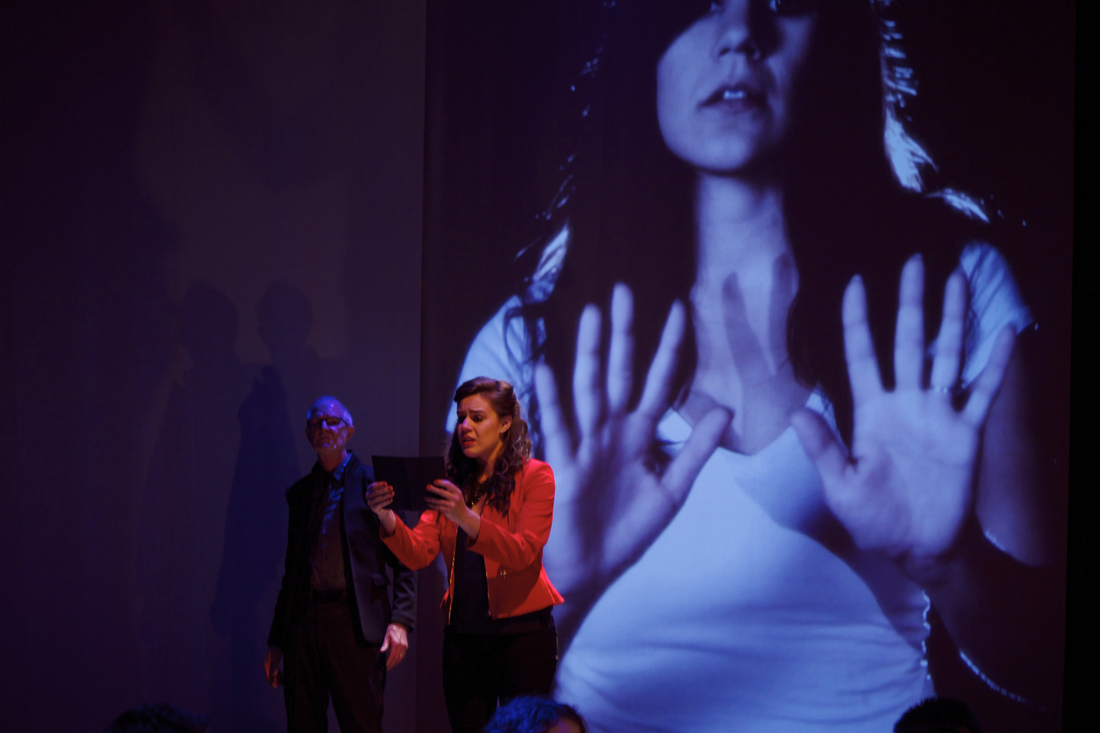|
The Shadow, a vigilante crime fighter in an eponymous early 20th-century radio drama, foiled evildoers by using his supernatural power to cloud others’ minds to mask his own physical and psychological presence. Each program began with the narrator’s tagline: “Who knows what evil lurks in the hearts of men? The Shadow knows!” The characters in “Noon at Dusk” — a new chamber opera by composer Stephen Lewis and librettist Yi Hong Sim (a colleague of mine at UCSD), recently premiered at UC-San Diego’s Conrad Prebys Music Center Experimental Theater — possess little criminal or evil intent, yet they likewise struggle against shadows and cloudy judgment. Across an inventive narrative arc and shot through with unsettling music, two couples face shadows of themselves and must consider precisely what lurks within their own hearts. No villainous operatic tropes here: Annelise & Daniela and Eliot & Lisha are two pairs of modern lovers with steady desk jobs won through higher education. Once the blush of their romances is established, separate superiors inform a member of each couple about an impending job opportunity requiring a cross-country transfer. The resulting decision-making attempts to drive the bulk of the drama.
So, yes, it’s an opera asking a very privileged question — will our love survive a work-required, long-distance relationship? — one that hasn’t been considered with such hand-wringing angst since Alvin Toffler published Future Shock in 1970. But just because “Noon at Dusk” illuminates white-collar ills doesn’t mean it suffers from the yuppie flu. In fact, its various components fuse solidly to deliver a moving, universal story about what really counts between 21st-century laborers off the clock. Sim’s libretto is appropriately ebullient during the romances and heart-breaking thereafter. Performed in English — though badly in need of supertitles, given the cacophonous nature of the medium — the narrative weaves between sober, contextual detail (I’m willing to wager this is and will remain the only opera in existence that twice has characters sing the phrase “water catchment”) and intriguing, moody psychologies. The story’s pivotal metaphor of a physiognotrace — a photo-booth of sorts that captures one’s silhouette on paper — is both charmingly antique and winningly fresh. In outline, these are lovers as young and foolish as any in literature (“What do I know of life?” Annelise sings, astutely); their inaugural consideration of those personal borders and what they contain is as wrenching as any, too. As Lisha sings, “So much seems fleeting, but something perseveres. It is as old as desire, but ever-new it appears.” Driving the anxiety of the tale are Lewis’ atonal undercurrents. Expertly performed by UCSD’s experimental ensemble, kallisti, the composition of “Noon at Dusk” also reaches back to early 20th-century touchstones (in production notes, Lewis acknowledges debts to Alban Berg’s Wozzeck and Debussy’s Pelléas et Mélisandre) to lace the drama with foreboding from the beginning. Duets between Eliot (Jonathan Nussman) and Lisha (Hillary Jean Young) often throb with and against the twisting tunes — sometimes catching the lift of a melody, sometimes showing alarm as it darts away from them. It must be said that Philip Larson, as Eliot’s older boss, is a delight. He stalks the stage, a callous, vampiric character — or perhaps a zombie is the better simile, given that he justifies his hunger for Eliot’s skills by chortling, “Just your brains will do!” — chewing his monstrous body language as much as his lines. The subtle but deeply effective lighting arrangements — narrow spots shining through revolving menageries of found objects, casting ever-shifting shadows among the characters’ own silhouettes — externalize the tug-of-war between internal noons and dusks, a minimalist technique helping this brief 80-minute student production to shine like a much more fully fledged standard.
0 Comments
Leave a Reply. |
this blahg
I'm THOMAS CONNER, Ph.D. in Communication & STS, and a longtime culture journalist. Categories
All
Archives
June 2024
|


 RSS Feed
RSS Feed